KATHMANDU, March 9 -- Like most Nepali women, she just aspired to become a teacher but now Onsari Gharti Magar is the vice chairwoman of Nepal's Constituent Assembly, the country's parliament.
"People thought that as a woman, the most I could achieve was to become a teacher and nothing more. And If I am here today it is because women are more aware of their values and rights even though the Nepali society remains very unequal," Magar told Xinhua in an interview as Nepal marked International Women's Day Saturday.
Magar, a leader of the Unified Communist Party of Nepal (Maoist) , is one of few Nepali women who have been appointed to a high political position.
The new government has been heavily criticized for lack of diversity in the cabinet, particularly because of the fact that only two out of the 21 ministers are women.
The number of female lawmakers in the second Constituent Assembly has also fallen to 30 percent from 33 earlier.
Magar is one of the 10 women among the 600 members of the CA who were elected through direct voting.
"In Nepal, it is not easy to win a seat through elections. You need money and power and women rarely make it to the top," the 36- year-old politician said.
A former Maoist rebel, Magar fought in 1999 in Rolpa, a Maoist stronghold, even when she was pregnant. A few months after giving birth to her first daughter, and carrying an infant on her back, she returned to the battlefield.
"My history is different from that of other female politicians. I grew up in a remote village and I am a farmer's daughter. The people's war brought drastic changes into my life," she said.
Women made up 40 percent of the Maoist rebel army during the 1996-2006 conflict.
Because of their idealism, Magar said she and her women comrades decided to discard their traditional housebound duties and joined the armed struggle against then abusive monarchial government. She said in the battlefield, everybody, either male or female, was equal.
"We used to walk all night long and rest during the day. We were treated just like men. From being a mere soldier, I later became a commander and now I am politician," she said.
But Magar is an exception to the rule.
In Nepal, women account for 51.50 percent of total population according to the latest census, but their representation continues to be minimal in politics as well as in other sectors.
According to the 2013 Human Development Report, Nepal ranks 148 out of 157 countries in the Gender Inequality Index.
Married to Maoist leader and former Finance Minister Barsha Man Pun,Magar said that in Nepal women lack the self-confidence and support to move forward.
"In our society if a wife's job and salary is better than that of her husband, the family members cannot accept it," Magar said, adding that in Nepal, women are usually considered "second-class citizens."
"If I go to a village with a male colleague he will be greeted first because men are perceived as superior and should be treated first in everything. I am among the country's top politicians and I can feel the gender gap; so just imagine how women in the villages are treated," Magar said.
A mother of two, Magar confessed that it is very difficult for her to manage both her professional and private life. She left both her children with her parents as soon as she stopped breastfeeding them.
"I have always prioritized my country rather than my family and children. Sometimes my children felt bad when some of their friends are with them all the time. But I always tell them that we should do something good for our country before we die," Magar said.
The theme for this year's International Women's Day is " Inspiring Change: Equality for Women is Progress for All." Throughout the world, thousands of events were held to mark the economic, political and social achievements of women. The first International Women's Day was held in 1911.
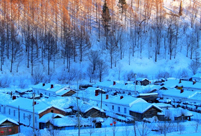 Chaihe village, pure and peaceful fairyland in snow
Chaihe village, pure and peaceful fairyland in snow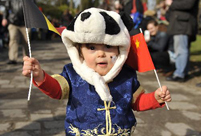 Belgians warmly welcome arrival of China's giant pandas
Belgians warmly welcome arrival of China's giant pandas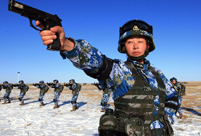 Female marines receive tactical training in NW China
Female marines receive tactical training in NW China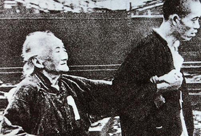 Blood memory: Nanjing Massacre in 1937
Blood memory: Nanjing Massacre in 1937 Top 10 pure beauties in showbiz
Top 10 pure beauties in showbiz British WWII veteran: I can't forgive Japan
British WWII veteran: I can't forgive Japan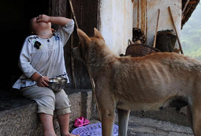 Tongban's dream of prosperity
Tongban's dream of prosperity Chinese frigate Yancheng holds drills in Mediterranean Sea
Chinese frigate Yancheng holds drills in Mediterranean Sea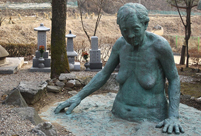 A visit to comfort woman's home in South Korea
A visit to comfort woman's home in South Korea Fairyland? Qingdao in sea of clouds
Fairyland? Qingdao in sea of clouds Top 10 most handsome faces in Asia in 2013
Top 10 most handsome faces in Asia in 2013 Female celebs with beautiful long legs
Female celebs with beautiful long legs Cat 'guardians' in Forbidden City
Cat 'guardians' in Forbidden City Large numbers of ancient coins excavated in Inner Mongolia
Large numbers of ancient coins excavated in Inner Mongolia Leisurely life beneath Zhonggulou, where time travels slower
Leisurely life beneath Zhonggulou, where time travels slowerDay|Week|Month